📣 For more lifestyle news, click here to join our WhatsApp Channel and also follow us on Instagram
As Ranbir Kapoor says he has ‘converted myself into a matcha guy because of my wife,’ nutritionist explains health impact of his drink
Are there other combinations people can try to make their daily matcha both tasty and healthy?
 Ranbir Kapoor loves drinking matcha (Source: Express Photo by Prashant Nadkar and Freepik)
Ranbir Kapoor loves drinking matcha (Source: Express Photo by Prashant Nadkar and Freepik)Matcha has become a popular morning drink for many health-conscious people, thanks to its antioxidants, calming properties, and gentle caffeine boost. Actor Ranbir Kapoor recently admitted that he too has made the switch, thanks to his wife, Alia Bhatt.
In an interview with Diet Sabya, he revealed, “’Fortunately or unfortunately, I have converted myself into a matcha guy because of my wife. Some people are really for it, and some are against it, but I enjoy it. A good matcha with almond milk and jaggery tastes pretty good and gives me my caffeine.”
While traditional matcha is usually whisked with water, experimenting with ingredients like plant-based milk and natural sweeteners has made it more approachable for people who may not enjoy its slightly bitter, earthy taste.
But how beneficial are these tweaks from a nutritional perspective? And are there other combinations people can try to make their daily matcha both tasty and healthy?
Before you switch up your morning beverage, it’s worth asking how much of a difference these additions really make.
Does adding almond milk and gud (jaggery) to matcha enhance its health benefits, or does it simply make the drink more palatable?
Aditi Prabhu, nutritionist and founder at NutroDynamix, tells indianexpress.com, “Yes, the addition of almond milk and jaggery does enhance its health benefits, but those benefits are very minute compared to matcha itself.”
She adds that almond milk provides certain micronutrients, such as vitamin E and healthy fats; however, its quality largely depends on how it is made and whether it is fortified. Similarly, jaggery provides minute quantities of micronutrients such as iron or potassium, provided it is organic and made in traditional ironware.
“Considering the total amount of almond milk and jaggery that goes into matcha, the addition of almond milk and jaggery mainly enhances its taste, texture, colour, and drinkability and minutely improves nutritional benefits,” states Prabhu.
Other nutritious combinations people can try with matcha
There are a few ingredients that can be used to balance taste and provide minor health benefits.
According to Prabhu, these ingredients include cinnamon (helps manage blood sugars), cardamom (supports gut health), soy milk (provides protein), moringa (provides antioxidants), and cocoa (supports mood).
How does matcha compare to coffee or regular tea in terms of long-term health effects?
Compared to regular coffee or tea, matcha has less caffeine, is gentler on the gut, reduces the risk of acidity, and is rich in antioxidants. Prabhu adds, “While these make matcha beneficial in the long term, Indians at large are used to consuming stronger drinks like tea and coffee, so the switch may feel difficult.”
“Also, when matcha is paired with add-ons like plant-based milk or sweeteners, it may not provide a lot of health benefits, but it makes the drink more gut-friendly, improves satiety and enhances drinkability,” concludes the expert.
DISCLAIMER: This article is based on information from the public domain and/or the experts we spoke to. Always consult your health practitioner before starting any routine.
📣 For more lifestyle news, click here to join our WhatsApp Channel and also follow us on Instagram



- 01
- 02
- 03
- 04
- 05
























